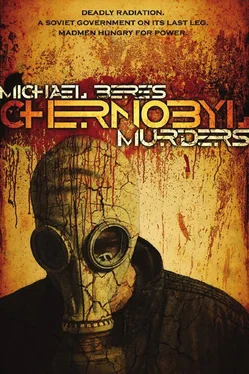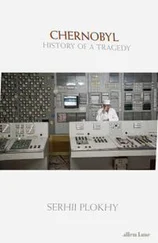Michael Beres - Chernobyl Murders
Здесь есть возможность читать онлайн «Michael Beres - Chernobyl Murders» весь текст электронной книги совершенно бесплатно (целиком полную версию без сокращений). В некоторых случаях можно слушать аудио, скачать через торрент в формате fb2 и присутствует краткое содержание. Жанр: Триллер, на английском языке. Описание произведения, (предисловие) а так же отзывы посетителей доступны на портале библиотеки ЛибКат.
- Название:Chernobyl Murders
- Автор:
- Жанр:
- Год:неизвестен
- ISBN:нет данных
- Рейтинг книги:4 / 5. Голосов: 1
-
Избранное:Добавить в избранное
- Отзывы:
-
Ваша оценка:
- 80
- 1
- 2
- 3
- 4
- 5
Chernobyl Murders: краткое содержание, описание и аннотация
Предлагаем к чтению аннотацию, описание, краткое содержание или предисловие (зависит от того, что написал сам автор книги «Chernobyl Murders»). Если вы не нашли необходимую информацию о книге — напишите в комментариях, мы постараемся отыскать её.
Chernobyl Murders — читать онлайн бесплатно полную книгу (весь текст) целиком
Ниже представлен текст книги, разбитый по страницам. Система сохранения места последней прочитанной страницы, позволяет с удобством читать онлайн бесплатно книгу «Chernobyl Murders», без необходимости каждый раз заново искать на чём Вы остановились. Поставьте закладку, и сможете в любой момент перейти на страницу, на которой закончили чтение.
Интервал:
Закладка:
“I hadn’t noticed. We didn’t need lights.” Nikolai smiled, then became serious. “What about your wife?”
Pavel walked to the window, looked up at the mix of smoke and clouds in the overcast sky. “I put her on the early bus to Kiev.”
“Were there others on the bus?” asked Nikolai.
“The bus was full,” said Pavel.
From inside a helicopter flying at a thousand meters, the fire looked like a kerosene smudge pot used to mark road construction. But as the helicopter flew closer, vibrating violently because of the heavy load of sand swinging below, the fire grew in size.
The helicopter pilot steered south, staying out of the cloud of bluish smoke. He dropped to five hundred meters and saw the spray from several fire hoses below. At one hundred meters, individual firemen were visible. Masks with cylindrical snouts covered the firemen’s faces. In their masks and coats and hats, the firemen looked like multicolored beetles.
“It’s a graphite fire!” shouted the pilot.
“Graphite’s supposed to stop the neutrons!” screamed the co-pilot. “Drop the load and go!”
Inside the low-level counting laboratory, two technicians in off-white caps who had just climbed the stairs from the basement watched the helicopter drop its load of sand and disappear beyond the trees to the west. The man and woman stayed inside the double doors of the building. On the road out front, an ambulance headed for the fire.
From where they stood, the man and woman could not see the fire, but they saw the thick smoke rising to the north.
“The graphite is burning,” said the woman. “What should we do?”
“The explosion must have cracked the concrete shell,” said the man. “We have no choice but to stay inside.”
“We’ve been here for hours with no word,” said the woman, heading for a rack on the wall near the door. She took several dosimeters from the rack and began looking into them, aiming one after another at the dull light coming through the glass doors. “They’re all at two hundred already. I thought the building was sealed.”
The man behind her walked slowly backward away from the doors.
“If we’ve already picked up two hundred millirems up here…”
The woman turned. “Where are you going?”
“Back to the basement. If there’s still water, I’m going to shower.
Then I’m staying down there until this is over. Are you coming?”
The woman dropped the dosimeters to the tile floor and followed the man, removing her off-white cap and throwing it aside as she ran.
Outside the building, farther along the road to Pripyat, a crowd had gathered at the crossroads beyond the main gate. Several vehicles were parked about, some militia and fire vehicles and a few private cars. The crowd consisted mostly of uniformed firemen, militiamen, and plant guards. But there was also a group of civilians who had been stopped at the crossroads, several men and women and even a few children. Many stared at the column of smoke in the distance.
An argument began between civilians and militiamen. A few men among the civilians began pushing and shoving, causing some women to scream. One young woman, slender, wearing a jacket over a cotton dress, held a little girl in one arm while holding the hand of another girl some years older. When a fireman wearing a filter mask approached and swept the slender probe of a Geiger counter in front of the woman and the two little girls, the woman backed away, and the little girls stared wide-eyed.
An ambulance sped to the gate from the plant. Instead of driving through, it skidded to a stop, the rear doors flew open, and at least a dozen firemen with blackened coats piled out. All of the firemen wore filter masks.
The fireman with the Geiger counter waved the probe frantically over the returned firemen and shouted obscenities through his filter mask. A bus drove up, and militiamen, firemen, and guards herded the civilians onto the bus like cattle. One fireman asked the woman with the two little girls the name of the youngest.
“Ilonka!” cried the woman. “Ilonka Horvath! She wants to know what’s become of her father, Mihaly Horvath!”
“I don’t know,” said the fireman, taking the little girl into his arms. “No one is allowed inside the facility except emergency workers. Come, Ilonka! Come, Mother! Hurry! The bus will take us to safety!” The fireman ran onto the bus ahead of the mother and the other little girl.
“Everyone get on the bus!” shouted a militiaman.
“But my car…” said one of the men.
“To hell with your car!” screamed the militiaman.
After the bus sped off, two militiamen wearing handkerchiefs over their noses and mouths stood together, looking at a man who had just driven up.
“KGB guard from the Belarussian border.”
“How can you tell?”
“He’s driving a Zhiguli instead of a Volga, and when he opened the window, I saw his green uniform.”
“He didn’t leave the window open long.”
“Not with this smell in the air. It’s like eating coins.”
Militiamen and plant guards moved aside as several buses rolled through the crossroads and headed down the road to Pripyat.
“I wonder how many buses are coming,” said one militiaman after the buses drove off. “Those came all the way from Kiev.”
“Yes, I saw the markings.”
“I wish I was in Kiev.”
The militiamen went silent, glancing at the KGB border guard in his green uniform who had gotten out of the Zhiguli and begun questioning plant guards.
The dashboard of the car was covered with a wet towel, and wet rags were stuffed into the side vents. From the back seat, Juli could see the road between Marina and her boyfriend, Vasily. Vasily’s hair was dark, like Mihaly’s. Despite black smoke obscuring the horizon, everything looked normal outside. A couple walking a dog, and a man on a bicycle, a school in session, brightly-lit inside with students raising their hands to a teacher at the front of the classroom.
“It’s an upside-down world,” said Vasily. “In some places, people are in a panic. Like at the hydrofoil dock on the river when they found out the run to Kiev was cancelled. But in other places, people go about their daily business.”
Vasily had come to the apartment to get Marina. He was aware of an explosion at Chernobyl, but because of the news blackout, did not know any details. Vasily was driving them the few blocks to Mihaly’s apartment to find out if Mihaly was home, to find out if Nina was there, to find out anything they could. To convince Vasily to take them, Juli had voiced her concern for Mihaly’s little girls, children who would be most susceptible to radiation.
So long as they sealed the car and stayed inside, they would be as safe as in the apartment. Juli held the dosimeter up to the light.
Forty millirems, another ten while they ran to the car, or inside the car because of Vasily’s drive from the village on the other side of the Chernobyl plant. Juli would check the dosimeter every few minutes. If there were increases, she would tell Vasily to hurry back to the apartment.
A militia car rushed past in the opposite direction, ignoring Vasily’s high speed.
“I saw plenty of them while driving here,” said Vasily. “The militia speeding around like maniacs. City workers washing streets.
No wonder some people assume everything is normal.”
“What was it like nearer the plant?” asked Juli.
“Never mind how it is near the plant,” said Vasily, briefly turning to Juli in the back seat. “You can’t go there!”
“I know,” said Juli. “I simply wondered.”
“Some private cars, all heading for Kiev. I saw people walking south. They carried suitcases. One farmer leading his livestock looked like Noah going to the ark. There were buses lined up on the side of the road outside Pripyat, but there didn’t seem to be a plan.
Читать дальшеИнтервал:
Закладка:
Похожие книги на «Chernobyl Murders»
Представляем Вашему вниманию похожие книги на «Chernobyl Murders» списком для выбора. Мы отобрали схожую по названию и смыслу литературу в надежде предоставить читателям больше вариантов отыскать новые, интересные, ещё непрочитанные произведения.
Обсуждение, отзывы о книге «Chernobyl Murders» и просто собственные мнения читателей. Оставьте ваши комментарии, напишите, что Вы думаете о произведении, его смысле или главных героях. Укажите что конкретно понравилось, а что нет, и почему Вы так считаете.












